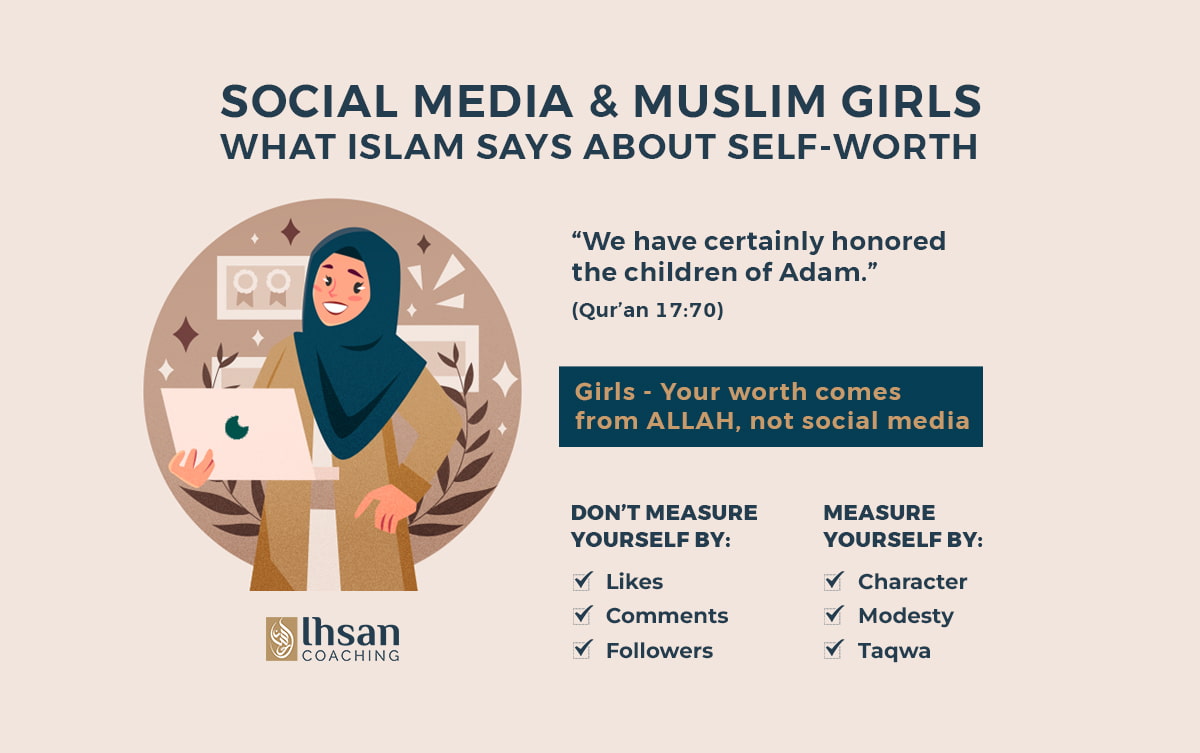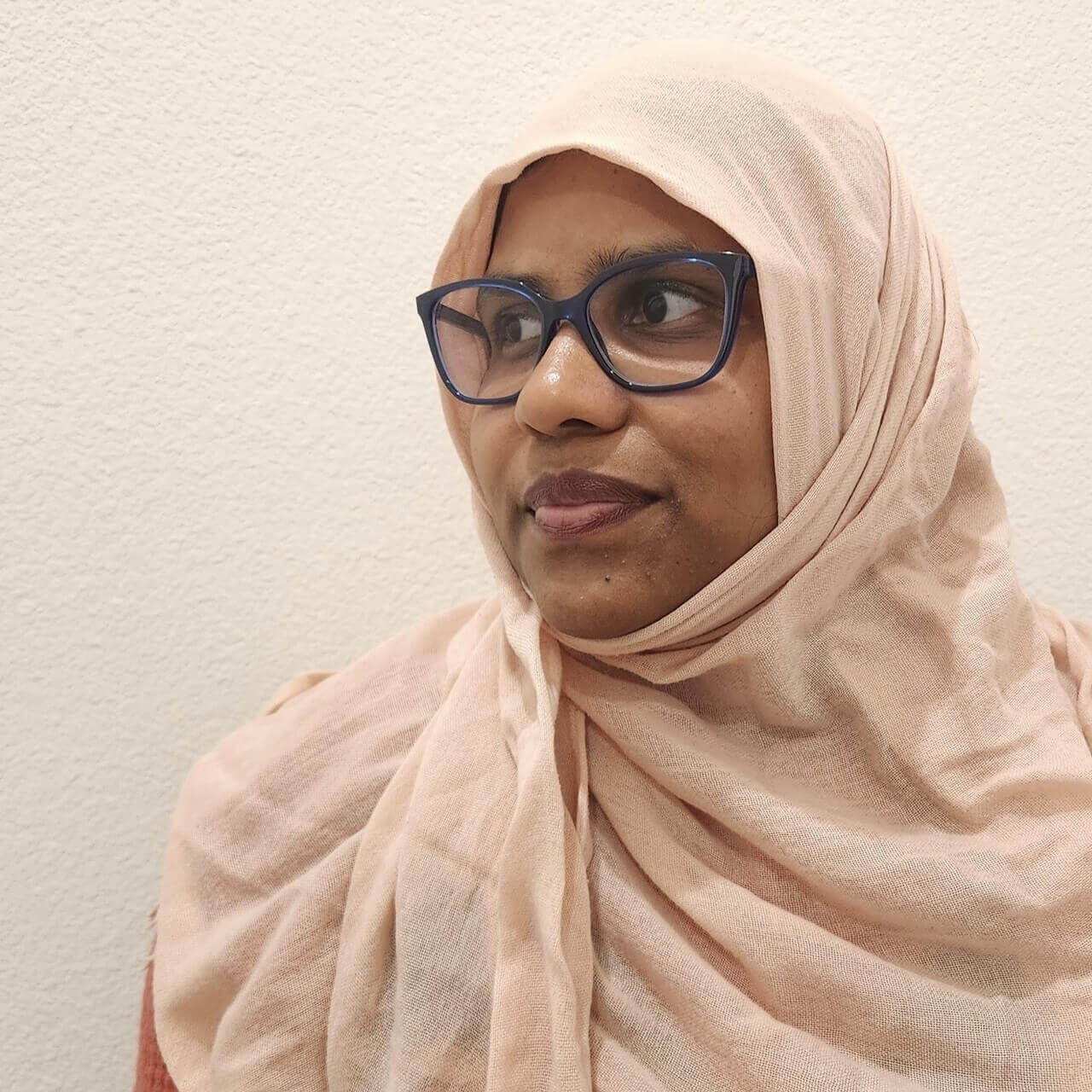In today’s digital age, the topic of social media and Muslim girls has become more relevant than ever. Unlike previous generations, young Muslim girls now face unique challenges shaped by constant online exposure. Social media plays a powerful role in shaping how they view themselves, how they engage with the world, and how they define their sense of self-worth.
Social Media & Muslim Girls
Social media platforms like Instagram, TikTok, Snapchat, and Facebook have become central to the lives of many teenagers and young adults. These platforms offer connection, entertainment, and opportunities for self, expression. But they also come with serious risks, especially when it comes to shaping ideas of beauty, success, and popularity.
For Muslim girls, this creates a unique tension. On one hand they are part of a global online culture that often promotes materialism, superficial beauty standards, and constant self-promotion. On the other hand, their faith calls them toward modesty, humility, and grounding their sense of worth in their relationship with Allah, not in worldly approval.
So, what does Islam say about self-worth? And how can Muslim girls navigate the world of social media without losing sight of their true value?

Understanding Self-Worth within Islam
Islam teaches that every human being has intrinsic value and dignity, regardless of how they look, how popular they are, or how much money they have. This worth comes from the simple fact that they are a creation of Allah.
In the Qur’an, Allah says:
وَلَقَدْ كَرَّمْنَا بَنِي آدَمَ
“We have certainly honored the children of Adam.” (Qur’an 17:70)
This honor is not tied to beauty, wealth, fame, or social media following. It is tied to our humanity and our role as servants of Allah.
Furthermore, Islam teaches that the most honored people in the sight of Allah are those who have the most piety and righteousness, not those who are the most attractive or the most admired by others:
إِنَّ أَكْرَمَكُمْ عِنْدَ اللَّهِ أَتْقَاكُمْ
“Indeed, the most noble of you in the sight of Allah is the most righteous of you.” (Qur’an 49:13)
This challenges the entire framework of social media, where worth is often measured in numbers: likes, followers, shares, and comments. Islam shifts the focus from external validation to internal character and one’s relationship with the Creator.
The Social Media Landscape: A Double Pressure
For Muslim girls, social media presents a double pressure:
- The universal pressure that all teenagers face, the pressure to look perfect, to be popular, and to keep up with trends.
- Religious and cultural expectations uphold modesty, dignity, and proper conduct, both online and offline.
This combination can be overwhelming. On one side, Muslim girls see influencers and celebrities whose appearance and lifestyle seem unattainable. On the other side, they may feel guilt or conflict when trying to balance their presence online with Islamic teachings.
They may ask themselves:
- How can I be active on social media without compromising my modesty?
- How do I handle comparison and jealousy?
- How can I stay true to my faith in an online environment that values appearance over substance?
Islam’s Guidance on Identity and Modesty
Islam provides a framework to protect individuals, particularly women, from being reduced to their physical appearance.
The Qur’an instructs both men and women to practice modesty:
قُلْ لِلْمُؤْمِنِينَ يَغُضُّوا مِنْ أَبْصَارِهِمْ وَيَحْفَظُوا فُرُوجَهُمْ
وَقُلْ لِلْمُؤْمِنَاتِ يَغْضُضْنَ مِنْ أَبْصَارِهِنَّ وَيَحْفَظْنَ فُرُوجَهُنَّ وَلَا يُبْدِينَ زِينَتَهُنَّ إِلَّا مَا ظَهَرَ مِنْهَا
“Tell the believing men to lower their gaze and guard their private parts… Tell the believing women to lower their gaze, guard their private parts, and not display their adornment except what is apparent of it…” (Qur’an 24:30, 31)
Modesty in Islam is not just about clothing. It includes behavior, speech, and the way one presents oneself in public (including online). This guidance is not meant to restrict women, but to preserve their dignity and ensure that their worth is not defined by their outward appearance.
For Muslim girls on social media, this can mean:
- Being mindful of the photos and videos they share.
- Avoiding content that objectifies them or turns them into a product for public consumption.
- Engaging in respectful, meaningful interactions instead of seeking empty validation.

Psychological Effects of Social Media on Self-Worth
Research shows that social media can have a negative effect on young people’s mental health. Studies have linked heavy social media use to increased anxiety, depression, loneliness, and poor body image.
For Muslim girls, the effects can be even more complicated:
- They may feel torn between wanting to fit in with peers and wanting to stay true to Islamic values.
- They may experience guilt or shame if they post something they later regret.
- They may face judgment not only from strangers online but also from members of their own community.
One of the most damaging aspects of social media is comparison. Girls are constantly comparing themselves to others, people they know and people they don’t know. But most of what they see online is carefully curated, filtered, and edited. This creates unrealistic standards that no one can live up to.
Islam teaches an antidote to this constant comparison: contentment (qana’ah) and gratitude (shukr). Prophet Muhammad (peace be upon him) said:
“Look at those who are below you and do not look at those who are above you, for that is more likely to keep you from belittling the blessings Allah has bestowed upon you.” (Bukhari and Muslim)
Steps Toward Healthy Social Media Use
Muslim girls can take practical steps to protect their mental, emotional, and spiritual well-being online.
- Be selective with who you follow. Follow people who inspire you to become a better person, not those who make you feel insecure.
- Limit your screen time. Take regular breaks. Remember that your real life and real connections are offline.
- Think before you post. Ask yourself: does this reflect my values? Would I be comfortable if my parents or religious leaders saw it?
- Focus on your intentions. Are you posting to show off, or to share something meaningful?
- Avoid toxic conversations. Do not engage in arguments or gossip online.
- Remind yourself of your true worth. You are valued by Allah, no amount of likes or followers can change that.
Nurturing Self-Worth Beyond Social Media
To build a strong sense of self-worth, Muslim girls need to develop aspects of their identity outside the online world.
- Spiritual growth. Build a personal connection with Allah through prayer, Qur’an, and reflection.
- Family and friends. Invest in real-life relationships with people who truly care about you.
- Education and skills. Focus on developing talents, learning, and serving others.
- Community involvement. Participate in activities that benefit others, not just yourself.
Individual Coaching Sessions
Social media is not inherently good or bad, it’s a tool. But like any tool, it can be used in ways that either strengthen or weaken a person’s well-being.
For Muslim girls, Islam offers timeless guidance: your worth is not defined by the world, but by your relationship with Allah. Modesty, character, and righteousness are your true measures of success.
By approaching social media with awareness, wisdom and individual coaching, Muslim girls can protect their self-worth and honor the dignity that Allah has given them.
FAQs
➡️ Does Islam prohibit social media usage for girls?
No. Islam does not prohibit social media, but it encourages using it in ways that uphold modesty, respect, and good character.
➡️ How can Muslim girls protect their modesty online?
By being mindful of what they post, how they interact, and avoiding self-promotion or content that objectifies themselves.
➡️ What should parents do to help their daughters?
Parents can talk openly about social media pressures, set boundaries, and encourage their daughters to focus on their relationship with Allah.
➡️ How does comparison on social media harm self-worth?
It creates unrealistic expectations and makes girls feel inadequate. Islam teaches contentment and gratitude as protection against this.
➡️ Can social media be used for good?
Yes. It can be used to spread knowledge, share positivity, support good causes, and connect with beneficial communities.
➡️ How do I know if social media is affecting my mental health?
If you feel anxious, jealous, sad, or obsessive after using social media, it may be time to take a break and reassess your usage.
➡️ Is it wrong to post selfies or personal photos?
Islam advises modesty and humility. Posting selfies isn’t automatically wrong, but intentions matter. Before posting, ask yourself why you’re posting and whether it aligns with your values.
➡️ What’s the best way to strengthen self-worth?
Focus on your inner relationship with Allah, develop your character, serve others, and limit reliance on external validation.
Ready to Reclaim Your Worth with Faith-Based Guidance?
At Ihsan Coaching, we understand the unique challenges Muslim girls face in today’s social media-driven world. Our religious consultation and individual coaching services are rooted in authentic Islamic teachings, helping you rediscover your self-worth through the lens of deen. Whether you’re struggling with body image, peer pressure, or identity confusion, we offer you a safe space to grow with clarity, confidence, and faith. Let’s realign your heart with who you truly are, a valuable, cherished soul in the eyes of Allah. Book your 1:1 session with Ihsan Coaching today.









